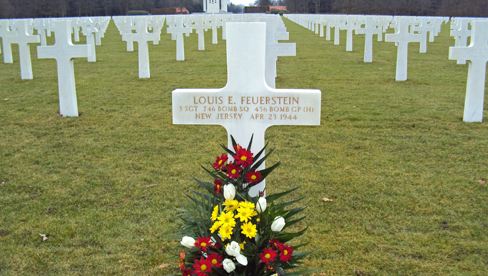
A World War II veteran’s overseas grave receives a rare visitor.
No one from Staff Sgt. Louis Feuerstein’s family had ever visited his grave. A co-worker of mine, Frank Giangerelli, told me about him. The fallen soldier was Frank’s great uncle – his grandmother’s brother – who died when he was shot down over Europe during World War II. He was buried at the Ardennes American Cemetery in Belgium. His parents, of course, and many of his siblings, are now deceased. That no one from the family had been to his grave weighed heavily on the mind of Frank’s grandmother. After learning of this, I informed Frank that I go to Belgium every year for the annual 82nd Airborne Division commemorative march to retrace many of the routes taken during the Battle of the Bulge. I told him I would go to the cemetery myself and place flowers and whatever else his grandmother would like at the grave. On a cold gray Friday in late February, three friends and I made our way down the gentle slope of the American Military Cemetery at Condroz in Belgium. We were seeking Plot C, Row 37, Grave 16 – the final resting place of Staff Sgt. Louis Feuerstein of New Jersey, who was killed when he was shot down over Europe on April 23, 1944, while serving with the 746th Bomb Squadron of the 456th Bomb Group (Heavy).As we walked, we could see to our left and right hundreds of crosses and Stars of David, all in perfect symmetry. Many of the inscriptions read “A Comrade Known But to God.” It seemed as if every state was represented.The cemetery was eerily quiet. Only a few visitors were there, including a man in an official uniform who was speaking with a small group of people. I could not make out what he was saying or figure out why they were gathered.Eventually, we reached the grave. I gazed upon it and thought about how, here, a young American rested far from his native New Jersey. I placed a small plaque and a letter written by Louis’ sister at the grave. I felt as if, through the letter, Louis was finally able to understand how much the family missed and loved him, even after 65 years. The plaque read, “Time forgets … but the heart always remembers.”We were starting to leave when the gentleman in the official uniform approached us. He introduced himself as Michael Green, superintendent of the cemetery. He informed us that he is a retired master sergeant who served in the U.S. Marine Corps. He saw us at Feuerstein’s grave and asked if I was a relative. “No, he was the relative of a good friend,” I responded, and explained the story.Green listened and said he would like to do something special in honor of our visit to pay respects. He ascended the slope to the chapel area while we stood near the grave. From out of the chapel came the first notes of “The Star Spangled Banner.” Shivers went through me. All four of us immediately stood at attention. When our national anthem was over, “Taps” played, reverberating through the cemetery.There could have been no greater moment for us – members of a generation made free by the sacrifices of Louis Feuerstein and so many other Americans – than to stand at this grave, listen to the familiar music and affirm that they will never be forgotten.As we prepared to depart, I thanked Green for what he had done. He said it was an honor. I told him that I was disappointed I could not find a florist in the area and that the family had wished to have flowers placed at the grave. “I will take care of it,” Green said. He made a phone call and told us flowers would arrive later in the day, and that he would place them at the grave and e-mail photographs to me. When I returned home, I checked my computer and found an e-mail with the heading MISSION ACCOMPLISHED. Attached were several photos of a beautiful floral arrangement at the grave of Staff Sgt. Louis Feuerstein. I told the Giangerelli family, who finally, after more than six decades, feel a bit of closure about the life and death of one of their loved ones.U.S. Army Special Forces retiree Tommy McArdle, now a police officer in New Jersey, is a historian and frequent visitor of battlegrounds from the European campaign of World War II.
- Magazine

